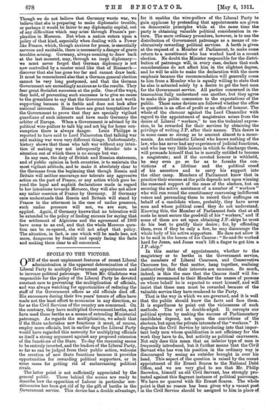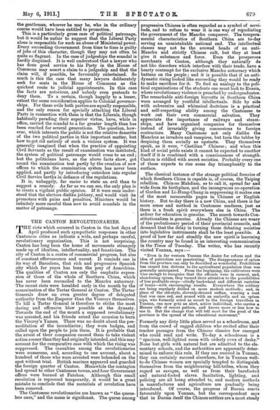SPOILS TO THE VICTORS.
ONE of the most unpleasant features of recent Liberal administration is the apparent determination of the Liberal Party to multiply Government appointments and to increase political patronage. When Mr. Gladstone was responsible for the policy of the Liberal Party he devoted constant care to preventing the multiplication of officials, and was always watching for opportunities of reducing the staff of the Government offices as old officials died off. His successors during their five years' tenure of office have made not the least effort to economise in any direction, so far as the Civil Services of the country are concerned. On the contrary, they have multiplied Government berths, and have used these berths as a means of extending Ministerial patronage. As regards the multiplication, we admit that if the State undertakes new functions it must, of course, employ more officials, but in earlier days the Liberal Party would have regarded this necessity for multiplying officials as itself a strong argument against any proposed extension of the functions of the State. To-day the reasoning seems to be entirely inverted, and the leaders of the Liberal Party, so far as can be judged from their public action, welcome the creation of new State functions because it provides opportunities for rewarding political supporters, or in some cases for getting rid of embarrassing political rivals.
The latter point is not sufficiently appreciated by the general public. Those behind the scenes are ready to describe how the opposition of Labour in particular con- stituencies has been got rid of by the gift of berths in the Government service. This device has a double advantage, for it enables the wire-pullers of the Liberal Party to gain applause by pretending that appointments are given on democratic principles while at the same time the party is obtaining valuable political consideration in re- turn. The more ordinary procedure, however, is to use the distribution of Government patronage as a means of un- obtrusively rewarding political services. A berth is given at the request of a Member of Parliament, to make some return to a constituent who has worked hard in a recent election. No doubt the Minister responsible for the distri- bution of patronage will, in every case, declare that such considerations do not affect him in the slightest degree, and he will be able to make the declaration with the more emphasis because the recommendation will generally come to him from a Member who is equally willing to state that he also is actuated solely by a desire to get the best man for the Government service. All parties concerned in the transaction fully understand one another, but they agree to make this polite concession to the expectations of the public. These same devices are followed whether the office in question is an office of profit or an office of honour. The whole of the clamour against the Lord Chancellor with regard to the appointment of magistrates arises from the desire of Liberal " workers," to use the technical expres- sion, to be rewarded for their services by obtaining the privilege of writing J.P. after their names. This desire is in some cases so strong as to amount almost to a mono- mania. An enthusiastic Liberal who knows nothing of the law, who has never had any experience of judicial functions, and who has very little leisure in which to discharge them, will persuade himself that he is morally entitled to become a magistrate; and if the coveted honour is withheld, he may even go so far as to forsake the con- victions of a lifetime and the political creed of his ancestors and to carry his support into the other camp. Members of Parliament know that in practice their success at the polls depends not upon winning the reasoned support of the mass of the electors, but on securing the active assistance of a number of " workers " who will run round the constituency canvassing indifferent voters and persuading them to record their suffrages on behalf of a candidate whom, probably, they have never seen and whose political creed they do not understand. Knowing this, the Member of Parliament feels that at all costs ho must secure the goodwill of his " workers," and if some of them are set upon obtaining J P -ships he must do his best to gratify their desire ; for, by offending them, even if they be only a. few, he may discourage the whole body of his active supporters. He dare not allow it to be said in the bosom of his Caucus : " So-and-So worked hard for Jones, and Jones won't lift a finger to get him a J.P.-ship."
In this matter of appointments, whether to the magistracy or to berths in the Government service, the members of Liberal Caucuses, and Conservative Caucuses too, for that matter, hang together, realising instinctively that their interests are common. So much, indeed, is this the case that the Caucus itself will fre- quently recommend to their Member the names of persons on whose behalf he is expected to exert himself, and will insist that these men must be rewarded because of the valuable service they have rendered to the Party.
That is the way in which we are governed, and it is well that the public should know the facts and face them. It is superfluous to point out the viciousness of such methods. The evil is double-edged. It corrupts our political system by making the success of Parliamentary candidates depend, not upon the convictions of the electors, but upon the private interests of the " workers." It degrades the Civil Service by introducing into that impor- tant body men whose qualification is not efficiency for the work they have to do, but activity as political canvassers. Not only does this mean that an inferior type of man is frequently introduced, but it further means that the Civil Servant who has won his position in the ordinary way is discouraged by seeing an outsider brought in over his head. This aspect of the question is raised by the recent appointment of Sir Ernest Soares to the National Debt Office, and we are very glad to see that Mr. Philip Snowden, himself an old Civil Servant, has strongly pro- tested against this flagrant instance of political patronage. We have no quarrel with Sir Ernest Soares. The whole point is that no reason has been given why a vacant post in the Civil Service should be assigned to him in place of the gentleman, whoever he may be, who in the ordinary course would have been entitled to promotion. This is a particularly gross case of political patronage, but it would be unfair to suggest that the Liberal Party alone is responsible for such an abuse of Ministerial power. Every succeeding Government from time to time is guilty of jobs of this character, though they may not often be quite so flagrant. In the case of judgeships the scandal is hardly disguised. It is well understood that a lawyer who has done good service to his Party in the House of Commons may assert a claim to a judgeship and that the claim will, if possible, be favourably entertained. So much is this the case that many lawyers deliberately seek for seats in the House of Commons as the quickest route to judicial appointments. In this case the facts are notorious, and nobody even pretends to deny them. To a certain, though happily to a lesser, extent the same consideration applies to Colonial governor- ships. For these evils both parties are equally responsible, and the only reason for specially attacking the Liberal Party in connection with them is that the Liberals, though habitually parading their superior virtue, have, while in office, carried the scandal to a far greater length than has been reached for several generations. The question, how- ever, which interests the public is not the relative demerits of the two political parties in this important matter, but how to get rid entirely of such a vicious system. It was generally imagined that when the practice of appointing Civil Servants as the result of examination was instituted, the system of political patronage would come to an end ; but the politicians have, as the above facts show, got round the examination test partly by the creation of new offices to which the examination system has never been applied, and partly by introducing outsiders into regular Civil Service berths in defiance of the regulations.
It is, unhappily, far easier to state an evil than to suggest a remedy. As far as we can see, the only plan is to create a vigilant public opinion. If it were once under- stood that the electors dislike jobbery, and would visit its promoters with pains and penalties, Ministers would be infinitely more careful than now to avoid scandals in the matter of patronage.











































 Previous page
Previous page